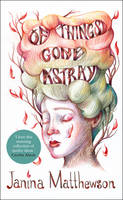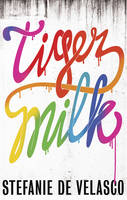Another pair of my recent reviews from We Love This Book:
Janina Matthewson, Of Things Gone Astray (2014)
 One day, people start to lose things. Reclusive old Mrs Featherby’s front wall disappears without warning. Robert loses his job in the most literal sense, as he discovers that his office building is no longer where it used to be. The keys are gone from Marcus’s piano, and he has no idea what else to play. These and other characters are faced with a strange new world, and not all of them will be able to adjust.
One day, people start to lose things. Reclusive old Mrs Featherby’s front wall disappears without warning. Robert loses his job in the most literal sense, as he discovers that his office building is no longer where it used to be. The keys are gone from Marcus’s piano, and he has no idea what else to play. These and other characters are faced with a strange new world, and not all of them will be able to adjust.Of Things Gone Astray may be Janina Matthewson’s first novel, but it marks her out as a writer to follow. There’s a wonderful, dream-like quality to Matthewson’s prose which binds together the most outlandish events and the emotional realities that they come to represent. The character Delia loses her sense of direction: at first, it seems she just can’t find her way around; but then we see that she abandoned her studies, and now has nowhere to go. Young Jake receives no good wishes from his father on his birthday – but the rift between the two goes much deeper than that.
So you can see the strange happenings in Of Things Gone Astray as reflecting the emotional states of its characters. But what rounds Matthewson’s novel out is that it can’t be reduced to a series of metaphors. Reality, fantasy and imagery intermingle to create a beautiful whole.
Stefanie de Velasco, Tiger Milk (2013)
Translated from the German by Tim Mohr (2014)
Nini and Jameelah are two 14-year-olds living in Berlin. Their lives are not plain sailing – Jameelah doesn’t know whether her family will shortly be deported back to Iraq, and Nini’s mother spends much of her time withdrawn into herself on the sofa – but the freedom of summer beckons. Drink of the season is tiger milk, the girls’ own concoction of chocolate milk, fruit juice and brandy. This cocktail represents Nini’s and Jameelah’s ambivalence towards the adult world: they want some of its attractions – in particular, to lose their virginity – but they also want to stay teenagers. Then tension between these opposing desires is central to the novel.
Tiger Milk never stands still: there’s always a new development, and Nini as first-person narrator will merrily skip over events if she wants, without waiting for the reader to catch up. Tim Mohr’s translation from the original German also captures this restless energy, the busy speech and constant action. De Velasco captures the sense of adolescence as a time of change and discovery: when you’re exploring the limits of yourself and the world around you, and seeing others move in both expected and unexpected directions. There’s also the sense of change that you didn’t see coming, as one period of life turns abruptly into the next, however much that summer seemed endless.

Recent Comments